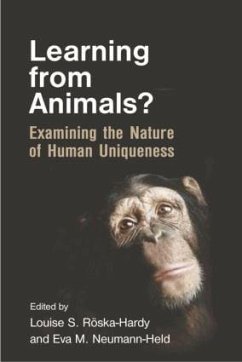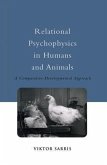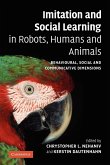Learning from Animals?
Examining the Nature of Human Uniqueness
Herausgeber: Röska-Hardy, Louise S.; Neumann-Held, Eva M.
Learning from Animals?
Examining the Nature of Human Uniqueness
Herausgeber: Röska-Hardy, Louise S.; Neumann-Held, Eva M.
- Broschiertes Buch
- Merkliste
- Auf die Merkliste
- Bewerten Bewerten
- Teilen
- Produkt teilen
- Produkterinnerung
- Produkterinnerung
In Learning from Animals? experts present empirical research, analyze issues raised by comparative approaches and debate their consequences for an understanding of human uniqueness.
Andere Kunden interessierten sich auch für
![Play and Exploration in Children and Animals Play and Exploration in Children and Animals]() Thomas G. PowerPlay and Exploration in Children and Animals95,99 €
Thomas G. PowerPlay and Exploration in Children and Animals95,99 €![Relational Psychophysics in Humans and Animals Relational Psychophysics in Humans and Animals]() Viktor SarrisRelational Psychophysics in Humans and Animals66,99 €
Viktor SarrisRelational Psychophysics in Humans and Animals66,99 €![Ants and Some Other Insects An Inquiry Into the Psychic Powers of These Animals Ants and Some Other Insects An Inquiry Into the Psychic Powers of These Animals]() August ForelAnts and Some Other Insects An Inquiry Into the Psychic Powers of These Animals9,99 €
August ForelAnts and Some Other Insects An Inquiry Into the Psychic Powers of These Animals9,99 €![Human Animals Human Animals]() Frank HamelHuman Animals17,99 €
Frank HamelHuman Animals17,99 €![The Dawn of Reason: Or, Mental Traits in the Lower Animals The Dawn of Reason: Or, Mental Traits in the Lower Animals]() James WeirThe Dawn of Reason: Or, Mental Traits in the Lower Animals18,99 €
James WeirThe Dawn of Reason: Or, Mental Traits in the Lower Animals18,99 €![Comparative Studies In The Psychology Of Ants And Of Higher Animals Comparative Studies In The Psychology Of Ants And Of Higher Animals]() Erich WasmannComparative Studies In The Psychology Of Ants And Of Higher Animals27,99 €
Erich WasmannComparative Studies In The Psychology Of Ants And Of Higher Animals27,99 €![Imitation and Social Learning in Robots, Humans and Animals Imitation and Social Learning in Robots, Humans and Animals]() Imitation and Social Learning in Robots, Humans and Animals66,99 €
Imitation and Social Learning in Robots, Humans and Animals66,99 €-
-
-
In Learning from Animals? experts present empirical research, analyze issues raised by comparative approaches and debate their consequences for an understanding of human uniqueness.
Produktdetails
- Produktdetails
- Verlag: Psychology Press
- Seitenzahl: 282
- Erscheinungstermin: 9. Dezember 2015
- Englisch
- Abmessung: 234mm x 156mm x 15mm
- Gewicht: 433g
- ISBN-13: 9781138877627
- ISBN-10: 113887762X
- Artikelnr.: 42794890
- Herstellerkennzeichnung
- Libri GmbH
- Europaallee 1
- 36244 Bad Hersfeld
- gpsr@libri.de
- Verlag: Psychology Press
- Seitenzahl: 282
- Erscheinungstermin: 9. Dezember 2015
- Englisch
- Abmessung: 234mm x 156mm x 15mm
- Gewicht: 433g
- ISBN-13: 9781138877627
- ISBN-10: 113887762X
- Artikelnr.: 42794890
- Herstellerkennzeichnung
- Libri GmbH
- Europaallee 1
- 36244 Bad Hersfeld
- gpsr@libri.de
Louise S. Röska-Hardy studied philosophy and linguistics, before taking her doctorate in philosophy, sociology, and linguistics in Frankfurt am Main. She has taught philosophy and linguistics at universities in Germany, Switzerland, and the USA. Eva M. Neumann-Held studied biology and philosophy. As researcher and lecturer she participated in numerous biophilosophical projects, among them "Genome and Organisms: Philosophical Interpretations of Developmental Biology". Currently she lectures in philosophy and biophilosophy at the University of Witten-Herdecke, Germany. Röska-Hardy and Neumann-Held are among the founders of the interdisciplinary research group "What are human beings? Culture-Language-Nature" (University of Dortmund and KWI).
J. Call
Foreword. Acknowledgements. L.S. Röska-Hardy
Introduction - Issues and Themes in Comparative Studies: Language
Cognition
and Culture. Part 1. Language. W. T. Fitch
Prolegomena to a Science of Biolinguistics. W. Wildgen
Sketch of an Evolutionary Grammar Based on Comparative Biolinguistics. A. Meguerditchian
J. Vauclair
Vocal and Gestural Communication in Nonhuman Primates and the Question of the Origin of Language. Part 2. Cognition. K.A. Bard
D.A. Leavens
Socioemotional Factors in the Development of Joint Attention in Human and Ape Infants. H. Rakoczy
Collective Intentionality and the Roots of Human Societal Life. J.-M. Burkart
Socio-cognitive Abilities and Cooperative Breeding. Z. Virányi
F. Range
L. Huber
Attentiveness Toward Others and Social Learning in Domestic Dogs. I. Brinck
From Similarity to Uniqueness: Method and Theory in Comparative Psychology. Part 3. Culture. C.A. Caldwell
Experimental Approaches to the Study of Culture in Primates. W. C. McGrew
How the Chimpanzee Stole Culture
or Lessons Learned from Labours in Cultural Primatology. D. Jamieson
Great Apes and the Human Resistance to Equality. M. Kettner
Apes and Human Dignity. L.S. Röska-Hardy
Postscript: Human Uniqueness in a Comparative Perspective.
Foreword. Acknowledgements. L.S. Röska-Hardy
Introduction - Issues and Themes in Comparative Studies: Language
Cognition
and Culture. Part 1. Language. W. T. Fitch
Prolegomena to a Science of Biolinguistics. W. Wildgen
Sketch of an Evolutionary Grammar Based on Comparative Biolinguistics. A. Meguerditchian
J. Vauclair
Vocal and Gestural Communication in Nonhuman Primates and the Question of the Origin of Language. Part 2. Cognition. K.A. Bard
D.A. Leavens
Socioemotional Factors in the Development of Joint Attention in Human and Ape Infants. H. Rakoczy
Collective Intentionality and the Roots of Human Societal Life. J.-M. Burkart
Socio-cognitive Abilities and Cooperative Breeding. Z. Virányi
F. Range
L. Huber
Attentiveness Toward Others and Social Learning in Domestic Dogs. I. Brinck
From Similarity to Uniqueness: Method and Theory in Comparative Psychology. Part 3. Culture. C.A. Caldwell
Experimental Approaches to the Study of Culture in Primates. W. C. McGrew
How the Chimpanzee Stole Culture
or Lessons Learned from Labours in Cultural Primatology. D. Jamieson
Great Apes and the Human Resistance to Equality. M. Kettner
Apes and Human Dignity. L.S. Röska-Hardy
Postscript: Human Uniqueness in a Comparative Perspective.
J. Call
Foreword. Acknowledgements. L.S. Röska-Hardy
Introduction - Issues and Themes in Comparative Studies: Language
Cognition
and Culture. Part 1. Language. W. T. Fitch
Prolegomena to a Science of Biolinguistics. W. Wildgen
Sketch of an Evolutionary Grammar Based on Comparative Biolinguistics. A. Meguerditchian
J. Vauclair
Vocal and Gestural Communication in Nonhuman Primates and the Question of the Origin of Language. Part 2. Cognition. K.A. Bard
D.A. Leavens
Socioemotional Factors in the Development of Joint Attention in Human and Ape Infants. H. Rakoczy
Collective Intentionality and the Roots of Human Societal Life. J.-M. Burkart
Socio-cognitive Abilities and Cooperative Breeding. Z. Virányi
F. Range
L. Huber
Attentiveness Toward Others and Social Learning in Domestic Dogs. I. Brinck
From Similarity to Uniqueness: Method and Theory in Comparative Psychology. Part 3. Culture. C.A. Caldwell
Experimental Approaches to the Study of Culture in Primates. W. C. McGrew
How the Chimpanzee Stole Culture
or Lessons Learned from Labours in Cultural Primatology. D. Jamieson
Great Apes and the Human Resistance to Equality. M. Kettner
Apes and Human Dignity. L.S. Röska-Hardy
Postscript: Human Uniqueness in a Comparative Perspective.
Foreword. Acknowledgements. L.S. Röska-Hardy
Introduction - Issues and Themes in Comparative Studies: Language
Cognition
and Culture. Part 1. Language. W. T. Fitch
Prolegomena to a Science of Biolinguistics. W. Wildgen
Sketch of an Evolutionary Grammar Based on Comparative Biolinguistics. A. Meguerditchian
J. Vauclair
Vocal and Gestural Communication in Nonhuman Primates and the Question of the Origin of Language. Part 2. Cognition. K.A. Bard
D.A. Leavens
Socioemotional Factors in the Development of Joint Attention in Human and Ape Infants. H. Rakoczy
Collective Intentionality and the Roots of Human Societal Life. J.-M. Burkart
Socio-cognitive Abilities and Cooperative Breeding. Z. Virányi
F. Range
L. Huber
Attentiveness Toward Others and Social Learning in Domestic Dogs. I. Brinck
From Similarity to Uniqueness: Method and Theory in Comparative Psychology. Part 3. Culture. C.A. Caldwell
Experimental Approaches to the Study of Culture in Primates. W. C. McGrew
How the Chimpanzee Stole Culture
or Lessons Learned from Labours in Cultural Primatology. D. Jamieson
Great Apes and the Human Resistance to Equality. M. Kettner
Apes and Human Dignity. L.S. Röska-Hardy
Postscript: Human Uniqueness in a Comparative Perspective.








